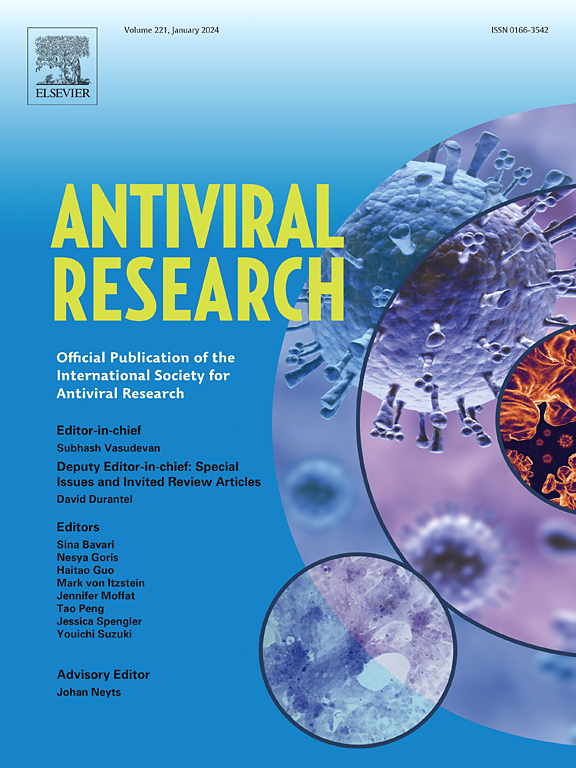基于3C底物设计的肽在体内表现出抗病毒作用
IF 4
2区 医学
Q1 PHARMACOLOGY & PHARMACY
引用次数: 0
摘要
肠病毒是一大群正义单链RNA病毒,包括许多人类病原体,如肠病毒A71 (EV-A71)、柯萨奇病毒和埃可病毒。这些肠道病毒引起的疾病对全球公共卫生构成重大威胁。3C蛋白是肠病毒中一种至关重要的蛋白酶,负责将病毒多蛋白切割成单独的活性蛋白。这一过程对病毒复制和发病机制至关重要,使3C成为开发抗肠道病毒药物的一个有吸引力的靶点。在本研究中,我们根据3C蛋白酶的几种底物序列设计和筛选多肽,旨在影响3C蛋白酶的功能,从而发挥抗病毒作用。最终,我们获得了一个在细胞水平上具有良好抗病毒活性的肽,我们将其命名为vp23。该肽有效地破坏了3C的蛋白酶活性,对EV-A71具有显著的体内保护作用,并对EV-A71、柯萨奇病毒A16 (CV-A16)和Echovirus 11 (Echo 11)等多种肠道病毒具有较强的抗病毒作用。综上所述,我们的研究结果表明,利用合理设计的肽靶向3C蛋白酶是一种有效的肠道病毒抗病毒策略。本文章由计算机程序翻译,如有差异,请以英文原文为准。
Peptides designed based on 3C substrates exhibit antiviral efficacy in vivo
Enteroviruses are a large group of positive-sense single-stranded RNA viruses including numerous human pathogens such as enterovirus A71 (EV-A71), coxsackieviruses, and echoviruses. The diseases caused by these enteroviruses pose a significant threat to global public health. The 3C protein is a crucial protease in enteroviruses, responsible for cleaving the viral polyprotein into individual active proteins. This process is essential for viral replication and pathogenesis, making 3C an attractive target for the development of anti-enteroviral drugs. In this study, we designed and screened peptides based on the sequences of several substrates of the 3C protease, aiming to impact the function of the 3C protease and thereby exert antiviral effects. Ultimately, we obtained a peptide with good antiviral activity at the cellular level, which we named vp23. This peptide effectively disrupted the protease activity of 3C, provided significant in vivo protection against EV-A71, and possessed strong antiviral effects against multiple enteroviruses such as EV-A71, Coxsackievirus A16 (CV-A16), and Echovirus 11 (Echo 11). Taken together, our results suggest that targeting 3C proteases using rationally designed peptides is an effective antiviral strategy against enteroviruses.
求助全文
通过发布文献求助,成功后即可免费获取论文全文。
去求助
来源期刊

Antiviral research
医学-病毒学
CiteScore
17.10
自引率
3.90%
发文量
157
审稿时长
34 days
期刊介绍:
Antiviral Research is a journal that focuses on various aspects of controlling viral infections in both humans and animals. It is a platform for publishing research reports, short communications, review articles, and commentaries. The journal covers a wide range of topics including antiviral drugs, antibodies, and host-response modifiers. These topics encompass their synthesis, in vitro and in vivo testing, as well as mechanisms of action. Additionally, the journal also publishes studies on the development of new or improved vaccines against viral infections in humans. It delves into assessing the safety of drugs and vaccines, tracking the evolution of drug or vaccine-resistant viruses, and developing effective countermeasures. Another area of interest includes the identification and validation of new drug targets. The journal further explores laboratory animal models of viral diseases, investigates the pathogenesis of viral diseases, and examines the mechanisms by which viruses avoid host immune responses.
 求助内容:
求助内容: 应助结果提醒方式:
应助结果提醒方式:


